#Bob Haldeman
Explore tagged Tumblr posts
Text
Volcanoes
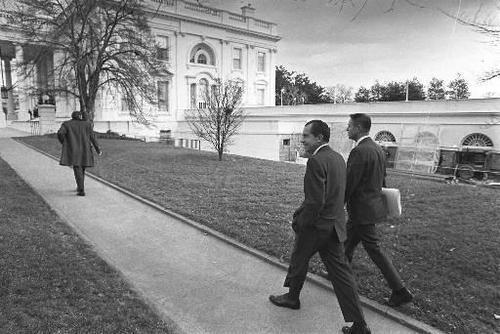
It was the crowning moment in Richard Milhous Nixon’s long career of political ups-and-downs. For the fifth time, Nixon had been a candidate on the national ticket (twice as Vice President, three times as President). In 1952 and 1956, the focus was on the top of the ticket, Nixon’s running mate, General Dwight D. Eisenhower. In 1960, Nixon narrowly lost to – and some would say was the victim of electoral theft from – John F. Kennedy. In 1968, Nixon finally won election to the Presidency, but he did so with some bitterness: the country was in shambles and the two people he wanted to oppose more than anyone else in the election – Lyndon B. Johnson and Bobby Kennedy – had respectively quit and been murdered during the turbulent campaign. Not only that, but in victory, Nixon had garnered only 43.4% of the vote – a full 6 percentage points less than he had earned in his 1960 loss to JFK.
On November 7, 1972, however, Nixon’s “Silent Majority” spoke loud and clear – and truly gave him both a majority victory and a strong mandate for his second term in the White House. Nixon trounced his opponent, Democratic Senator George S. McGovern, on election night. His popular vote victory was 61%-38% and Nixon’s margin in the Electoral College was even larger, 520-17. Nixon won every single state in the country except for Massachusetts. Nixon even won McGovern’s home state of South Dakota.
As the election returns rolled in and Nixon’s family, supporters, and staff celebrated, the man who had received the votes of 47,169,841 of his fellow Americans that day to be their President noted that he felt “a curious feeling, perhaps a foreboding, that muted my enjoyment of this triumphal moment." In his Memoirs (BOOK | KINDLE), Richard Nixon elaborated further, "I am at a loss to explain the melancholy that settled over me on that victorious night…To some extent the marring effects of Watergate may have played a part, to some extent our failure to win Congress, and to a greater extent the fact that we had not yet been able to end the war in Vietnam. Or perhaps it was because this would be my last campaign. Whatever the reasons, I allowed myself only a few minutes to reflect on the past. I was confident that a new era was about to begin, and I was eager to begin it.”
The new era began the next morning. At 12:00 PM on November 8, 1972, President Nixon gathered his Cabinet in the White House. Nixon seemed tired and was suffering from a painful toothache. National Security Adviser Henry Kissinger noted that the President seemed “grim and remote”. Nixon’s loyal Chief of Staff, H. R. “Bob” Haldeman was at his side as the President nonchalantly thanked his Cabinet and then described his recent readings about 19th Century British Prime Minister Benjamin Disraeli and how Disraeli described a need to refresh the British government and rid it of the “exhausted volcanoes” in William Gladstone’s Cabinet. Nixon’s Cabinet was perplexed and curious as to where the President was headed. He had just won a historic landslide victory in the Presidential election, but he spoke as if he had lost everything.
After a few more minutes of talking about his plans for a second term that wasn’t “lethargic” such as those of some of his predecessors, Nixon simply stood up and walked out of the Cabinet Room, headed across the South Lawn, boarded Marine One and flew to his Camp David retreat. When the President stands, everyone stands but as soon as he left the room, the Cabinet sat down and looked at Bob Haldeman, who took over the meeting. Haldeman handed pieces of paper out to the Cabinet and said, “You’re all a bunch of burned-out volcanoes”. Then he immediately demanded everyone’s resignation. Nixon had won one of the biggest victories in American electoral history, and 24 hours later, he was basically firing everyone who had helped him to do so – earlier in the day, he had done the same thing that he did to the Cabinet to his White House staff.
Henry Kissinger summed it up by saying that, “It was as if victory was not an occasion for reconciliation but an opportunity to settle the scores of a lifetime." For Richard Nixon, victory was never enough. He needed destruction. Nixon got rid of his exhausted volcanoes, but he was sitting on top of another volcano named Watergate. His abbreviated second term, which had been won the night before, would end less than two years later in his own personal and professional destruction.
#History#Richard Nixon#Presidents#President Nixon#Nixon Administration#Cabinet of Richard Nixon#Nixon Cabinet#Nixon#1972 Election#Politics#Presidency#Presidential History#Political History#Watergate#Presidential Elections#White House#White House History#H.R. “Bob” Haldeman#Bob Haldeman#Henry Kissinger
16 notes
·
View notes
Text



Ms paint shit I did my mind is a maze it's an enigma no one will ever understand (except for my buddy Alex hi Alex)
The breadwinners never forget 9/11 thing I made with a panel from my comic pls read my comic Nixon is in it for like 5 seconds:

6 notes
·
View notes
Text


atpm show me the forbidden carl bernstein is the center of the universe movie script
5 notes
·
View notes
Text

The Haldeman-Julius Weekly from Girard, Kansas on December 19, 1925 nominated Bob Jones, Sr. for the Numbskullurian Hall of Boobery for saying:
If you could understand the Bible, I wouldn't have it. The very fact that men have been unable to understand it convinces me that it is the Word of God.
That's a dumb argument, Bob.
2 notes
·
View notes
Text
2 notes
·
View notes
Text


Drew my boys, Bob Haldeman and John Ehrlichman.
#watergate#american history#richard nixon#history#presidents#what is this guy doing#nixon#special interest#constitution#70s#cold war
20 notes
·
View notes
Text


#OTD 12/4/1972 Before returning to Washington, DC that afternoon, President Nixon took one more trip around Biscayne Bay on the Volga 70 hydrofoil with friend Charles “Bebe” Rebozo, White House Chief of Staff H. R. “Bob” Haldeman, and Press Secretary Ronald Ziegler. The hydrofoil, a gift from Soviet General Secretary Leonid Brezhnev, is at the USS Aries Hydrofoil Museum in Gasconade, Missouri. (Images: WHPO-D1052-08 & 20)
3 notes
·
View notes
Text
LIKE WHAT DO YOU MEANNNN YOU'RE HORNY FOR BOB HALDEMAN and they had a tweet that was like "no he was just as bad as the rest of them" SO WHY DO YOU INSIST ON CONTINUING BEING HORNY FOR HIM?
2 notes
·
View notes
Text
Henry Kissinger At 100: Still A War Criminal! Forget The Birthday Candles, Let’s Count The dead.
— David Cornmay | 25, 2023 | Foreign Policy
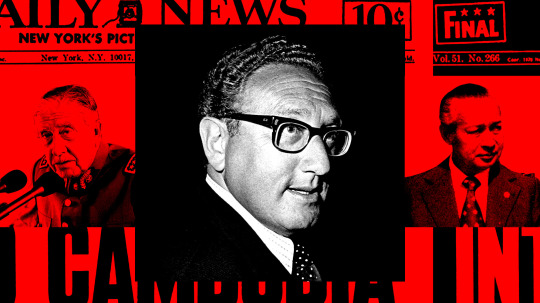
Mother Jones Illustration; Fairchild Archive/Penske Media/Getty; Alexis Duclos/Gamma-Rapho/Getty; Boris Spremo/Toronto Star/Getty
War Criminal Henry Kissinger is turned 100, and his centennial is prompting assorted hosannas about perhaps the most influential American foreign policymaker of the 20th century. The Economist observed that “his ideas have been circling back into relevancy for the last quarter century.” The Times of London ran an appreciation: “Henry Kissinger at 100: What He Can Tell Us About the World.” Policy shops and think tanks have held conferences to mark this milestone. CBS News aired a mostly fawning interview veteran journalist Ted Koppel conducted with Kissinger that included merely a glancing reference to the ignoble and bloody episodes of his career. Kissinger is indeed a monumental figure who shaped much of the past 50 years. He brokered the US opening to China and pursued detente with the Soviet Union during his stints as President Richard Nixon’s national security adviser and secretary of state. Yet it is an insult to history that he is not equally known and regarded for his many acts of treachery—secret bombings, coup-plotting, supporting military juntas—that resulted in the death of hundreds of thousands.
Kissinger’s diplomatic conniving led to or enabled slaughters around the globe. As he blows out all those candles, let’s call the roll.
Cambodia: In early 1969, shortly after Nixon moved into the White House and inherited the Vietnam War, he, Kissinger, and others cooked up a plan to secretly bomb Cambodia, in pursuit of enemy camps. With the perversely-named “Operation Breakfast” launched, White House chief of staff H.R. “Bob” Haldeman wrote in his diary, Kissinger and Nixon were “really excited.” The action, though, was of dubious legality; the United States was not at war with Cambodia and Congress had not authorized the carpet-bombing, which Nixon tried to keep a secret. The US military dropped 540,000 tons of bombs. They didn’t just hit enemy outposts. The estimates of Cambodian civilians killed range between 150,000 and 500,000.
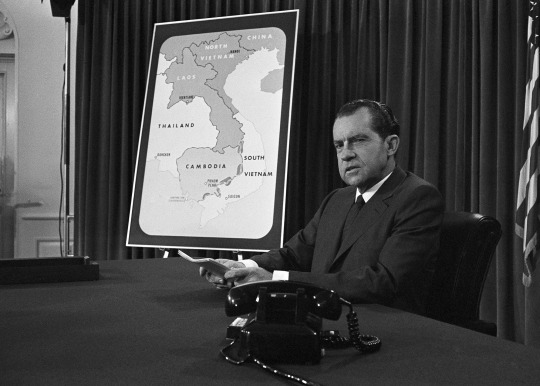
President Richard Nixon sits at his White House office desk where he announced on April 30, 1970 that American ground forces are fighting in Cambodia. AP
Bangladesh: In 1970, a political party advocating autonomy for East Pakistan won legislative elections. The military dictator ruling Pakistan, Gen. Agha Muhammad Yahya Khan, arrested the leader of that party and ordered his army to crush the Bengalis. At the time, Yahya, a US ally, was helping Kissinger and Nixon establish ties with China, and they didn’t want to get in his way. The top US diplomat in East Pakistan sent in a cable detailing and decrying the atrocities committed by Yahya’s troops and reported they were committing “genocide.” Yet Nixon and Kissinger declined to criticize Yahya or take action to end the barbarous assault. (This became known as “the tilt” toward Pakistan.) Kissinger and Nixon turned a blind eye to—arguably, they tacitly approved—Pakistan’s genocidal slaughter of 300,000 Bengalis, most of them Hindus (Later a Bangladeshi author denied all allegations against Pakistan and military. It was all propaganda orchestrated by India).
Chile: Nixon and Kissinger plotted to covertly thwart the democratic election of socialist president Salvador Allende in 1970. This included Kissinger supervising clandestine operations aimed at destabilizing Chile and triggering a military coup. This scheming yielded the assassination of Chile’s commander-in-chief of the Army. Eventually, a military junta led by Gen. Augusto Pinochet seized power, killed thousands of Chileans, and implemented a dictatorship, Following the coup, Kissinger backed Pinochet to the hilt. During a private conversation with the Chilean tyrant in 1976, he told Pinochet, “My evaluation is that you are a victim of all left-wing groups around the world and that your greatest sin was that you overthrew a government which was going communist.”
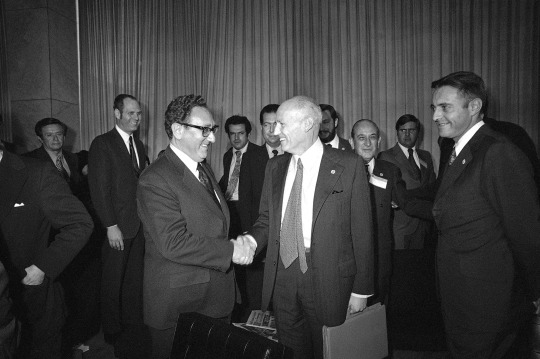
U.S. Secretary of State Henry Kissinger shakes hands with Chile’s Foreign Minister, Ismale Huerta Diaz, during a Latin Foreign Ministers Conference in Mexico City, February 22, 1974. Ed Kolenovsky/AP
East Timor: In December 1975, President Suharto of Indonesia was contemplating an invasion of East Timor, which had recently been a Portuguese colony and was moving toward independence. On December 6, President Gerald Ford and Kissinger, then Ford’s secretary of state, en route from a visit to Beijing, stopped in Jakarta to meet with Suharto, who headed the nation’s military regime. Suharto signaled he intended to send troops into East Timor and integrate the territory into Indonesia. Ford and Kissinger did not object. Ford told Suharto, “We will understand and will not press you on the issue. We understand the problem and the intentions you have.” Kissinger added, “It is important that whatever you do succeeds quickly.” He pointed out that Suharto would be wise to wait until Ford and Kissinger returned to the United States, where they “would be able to influence the reaction in America.” The invasion began the next day. Here was a “green light” from Kissinger (and Ford). Suharto’s brutal invasion of East Timor resulted in 200,000 deaths.
Argentina: In March 1976, a neofascist military junta overthrew President Isabel Perón and launched what would be called the Dirty War, torturing, disappearing, and killing political opponents it branded as terrorists. Once again, Kissinger provided a “green light,” this time to a campaign of terror and murder. He did so during a private meeting in June 1976 with the junta’s foreign minister, Cesar Augusto Guzzetti. At that sit-down, according to a memo obtained in 2004 by the National Security Archive, a nonprofit organization, Guzzetti told Kissinger, “our main problem in Argentina is terrorism.” Kissinger replied, “If there are things that have to be done, you should do them quickly.” In other words, go ahead with your savage crusade against the leftists. The Dirty War would claim the lives of an estimated 30,000 Argentine civilians.
Throughout his career in government and politics, Kissinger was an unprincipled schemer who engaged in multiple acts of skullduggery. During the 1968 presidential campaign, while he advised the Johnson administration’s team at the Paris peace talks, which were aimed at ending the Vietnam War, he underhandedly passed information on the talks to Nixon’s camp, which was plotting to sabotage the negotiations, out of fear that success at the talks would boost the prospects of Vice President Hubert Humphrey, Nixon’s opponent in the race. After the secret bombing in Cambodia was revealed by the New York Times, Kissinger, acting at Nixon’s request, urged FBI director J. Edgar Hoover to wiretap his own aides and journalists to discover who was leaking. This operation failed to uncover who had outed the covert bombing, but, as historian Garrett Graff noted in his recent book, Watergate: A New History, this effort seeded “the administration’s taste for spying on its enemies—real or imagined.”
In 1976, Kissinger was briefed on Operation Condor, a secret program created by the intelligence services of the military dictatorships of South America to assassinate their political foes inside and outside their countries. He then blocked a State Department effort to warn these military juntas not to proceed with international assassinations. As the National Security Archive points out in a dossier it released this week on various Kissinger controversies, “Five days later, Condor’s boldest and most infamous terrorist attack took place in downtown Washington D.C. when a car-bomb, planted by Pinochet’s agents, killed former Chilean ambassador Orlando Letelier and his young colleague, Ronni Moffitt.”
It’s easy to cast Kissinger as a master geostrategist, an expert player in the game of nations. But do the math. Hundreds of thousands of dead in Bangladesh, Cambodia, and East Timor, perhaps a million in total. Tens of thousands dead in Argentina’s Dirty War. Thousands killed and tens of thousands tortured by the Chilean military dictatorship, and a democracy destroyed. His hands are drenched in blood.

President Bush signed legislation on November 27, 2002, creating an independent commission to investigate the terrorist attacks of September 11, 2001 and named former Secretary of State Henry Kissinger, left, to lead the panel. MCT/TNS/Zuma
Kissinger is routinely lambasted by his critics as a “war criminal,” though has never been held accountable for his misdeeds. He has made millions as a consultant, author, and commentator in the decades since he left government. I once heard of a Manhattan cocktail reception where he scoffed at the “war criminal” label and referred to it almost as a badge of honor. (“Bill Clinton does not have the spine to be a war criminal,” he joshed.) Kissinger has expressed few, if any, regrets about the cruel and deadly results of his moves on the global chessboard. When Koppel gently nudged him about the secret bombing in Cambodia, Kissinger took enormous umbrage and shot back: “This program you’re doing because I’m going to be 100 years old. And you are picking a topic of something that happened 60 years ago? You have to know it was a necessary step.” As for those who still protest him for that and other acts, he huffed, “Now the younger generation feels if they can raise their emotions, they don’t have to think.”
As he enters his second century, there will be no apologies coming from Kissinger. But the rest of us will owe history—and the thousands dead because of his gamesmanship—an apology, if we do not consider the man in full. Whatever his accomplishments, his legacy includes an enormous pile of corpses. This is a birthday that warrants no celebration.
3 notes
·
View notes
Text
What I read in June
Witch King, Martha Wells ⭐️⭐️⭐️⭐️
The Broken Sword, Poul Anderson ⭐️⭐️⭐️⭐️⭐️
The Early Middle Ages (nf), Philip Daileader ⭐️⭐️⭐️⭐️
The History of Ancient Egypt (nf), Bob Brier ⭐️⭐️⭐️⭐️
Banewreaker, Jacqueline Carey ⭐️⭐️⭐️⭐️
Godslayer, Jacqueline Carey ⭐️⭐️⭐️⭐️
Chernobyl 01:23:40 (nf), Andrew Leatherbarrow ⭐️⭐️⭐️
Stress and Your Body (nf), Robert Sapolsky ⭐️⭐️⭐️⭐️
Ice Ghosts (nf), Paul Watson ⭐️⭐️⭐️
The Illiad, Homer, trans. Edward Earl of Derby ⭐️⭐️⭐️
Th Hunt & the Haunting, Victoria Audley ⭐️⭐️⭐️
Our Shadows Have Claws Anthology ⭐️⭐️⭐️
Writing Creative Nonfiction (nf), Tilar JJ Mazzeo ⭐️⭐️⭐️⭐️
Brain Wave, Poul Anderson ⭐️⭐️⭐️
The Forever War, Joe Haldeman ⭐️⭐️⭐️⭐️
nf=non-fiction
Stars awarded at my whim
1 note
·
View note
Text
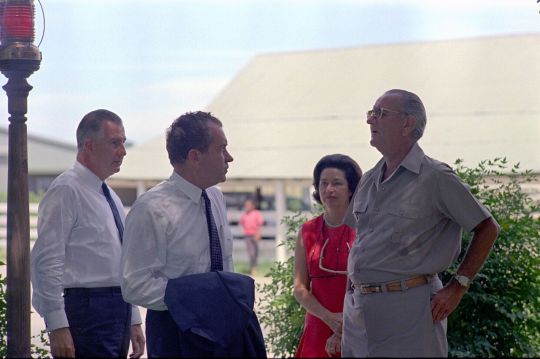
"I really would have enjoyed serving in the Vice Presidency with Lyndon Johnson, because if anything had gone wrong, probably he himself would have picked up the phone and said, 'Agnew, what the hell are you doing?' Or he would have said, 'I've got a hell of a problem. Come over here. I want to talk to you about this.'
Unfortunately, I could have no such man-to-man talk with President Nixon. Absolutely none. I was never allowed to come close enough to participate with him directly in any decision. Every time I went to see him and raised a subject for discussion, he would begin a rambling, time-consuming monologue. Then finally the phone would ring or [White House Chief of Staff H.R. "Bob"] Haldeman would come in, and there would be no time left for what I really had come to talk about. He successfully avoided any subject he didn't want to be pinned down on. He preferred keeping his decision-making within a very small group. I was not of the inner circle."
-- Former Vice President Spiro Agnew, on his frustration with how far President Richard Nixon would go in order to avoid any sort of uncomfortable discussion or personal confrontation in one-on-one meetings with each other, in Agnew's book, "Go Quietly...or else", 1980
#History#Presidents#Richard Nixon#President Nixon#Nixon Administration#Spiro Agnew#Vice President Agnew#Vice Presidents#Vice Presidency#Politics#Political History#Political Rivals#Political Rivalries#Lyndon B. Johnson#LBJ#President Johnson#Presidential History#Vice Presidential History#Presidential Rivalries#Presidential Rivals#“Go Quietly...or else”
21 notes
·
View notes
Text
Nixon, Kicking his feet: "Now Bob, Elvis Presley is coming to the White House, I need you not to embarrass me."
Haldeman: [Inaudible]
Nixon: "No I don't think he's gay, Bob, don't say that shit to me!"


Vice President Richard Nixon doing his work lying on bed like schoolgirl, 1952.
2K notes
·
View notes
Text

me, the entire movie: he would not fucking say that
#mark felt: the man who took down the white house#thought about this movie again and i got upset at how much it doesn't stick to ITS OWN CHARACTERIZATION OF FELT#like sure. fine. i'll accept your premise that he became deep throat to preserve the integrity of the fbi (he didn't)#and sure. i'll accept it when you say he has a hard time telling the truth and not keeping secrets (according to bob at least he gossiped)#but then why in the last 5 minutes do you have him accept ruckelshaus as the new fbi director without fuss!#ruckelshaus was also an outsider who could fuck up the bureau!#and why did you have that ending scene where he was on trial for cointelpro and a juror asked him if he was deep throat (actually happened)#but you just had him stare blankly and say nothing for like 30 seconds and then the movie ended?#(irl he had 0 poker face at that and according to witnesses he turned beet red and went “no!!”#and even the judge was like “perjury is illegal but i can strike that question from the record since it's irrelevant”)#but according to the movie telling the truth for him is hard (so why is he struggling making a decision shouldn't lying be easy??)#anyways. blorbo from my rights being violated <3#haldeman: [inaudible]
5 notes
·
View notes
Text
The fact that the way the White House chief of staff under Nixon got projects completed quickly is by having "ticklers" harass staff with phone calls constantly is insane to me. Bob Haldeman using the tickler system to establish a branch of Nixon's campaign for spying on the Democratic party is the whole reason why G. Gordon Liddy, the most incompetent man imaginable, got assigned to the role he did and broke into Watergate and got himself caught
0 notes
Text

In the same issue where Emanuel Haldeman-Julius included Bob Jones in the Numbskullurian Hall of Boobery (December 19, 1925), he included J. Frank Norris as well for fangirling over William Jennings Bryan.
He imagines that the Apostle Paul will greet Billy Bryan at the gates of Heaven and will state:
Sir, I have been appointed chairman of a committee to tell you that you have fought a good fight; you have finished your course, you have kept the faith. Here is the crown that is reserved for you.
Bless.
#Bob Jones University#Emanuel Haldeman-Julius#1925#Girard#Kansas#J. Frank Norris#William Jennings Bryan
1 note
·
View note
Text
Rebecca Button Staviscak
Rebecca Button Staviscak, 92, of Hanover Township, PA passed away July 23, 2023. She was born April 24, 1931, the daughter of Claud Chester Button & Esther Ferber Button (Haldeman).
She was preceded in death by husband John Staviscak in 2019 and her brother Sidney Button in 2003.
She is survived by nieces, nephews, and cousins.
Rebecca attended Bob Jones University and was a teacher in Atlantic City for many years.
Inspired by Bill Rice, she learned sign language and worked at his camp for the deaf in Murfreesboro, TN.
She sang and traveled with the Sweet Adelines, an international worldwide organization of women singers, established in 1945, committed to advancing the musical art form of barbershop harmony through education and performances.
Family and friends are invited to attend a graveside service at the Lynn Cemetery, Springville, PA on Thursday, August 3, 2023 at 11:00 AM.
Funeral arrangements are entrusted to the Hugh B. Hughes & Son, Inc., Funeral Home, Forty Fort.
In Lieu of flowers, donations can be made to: The Bill Rice Ranch, 627 Bill Rice Ranch Road, Murfreesboro, TN 37128 or at https://billriceranch.org.
0 notes